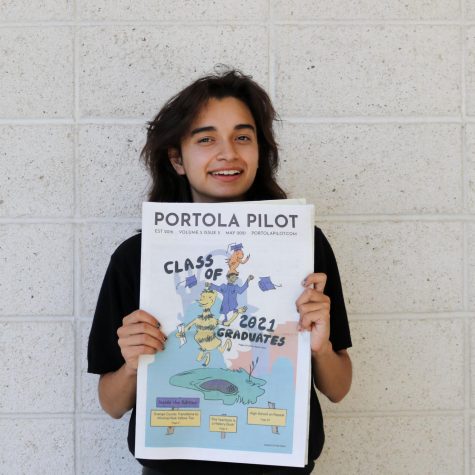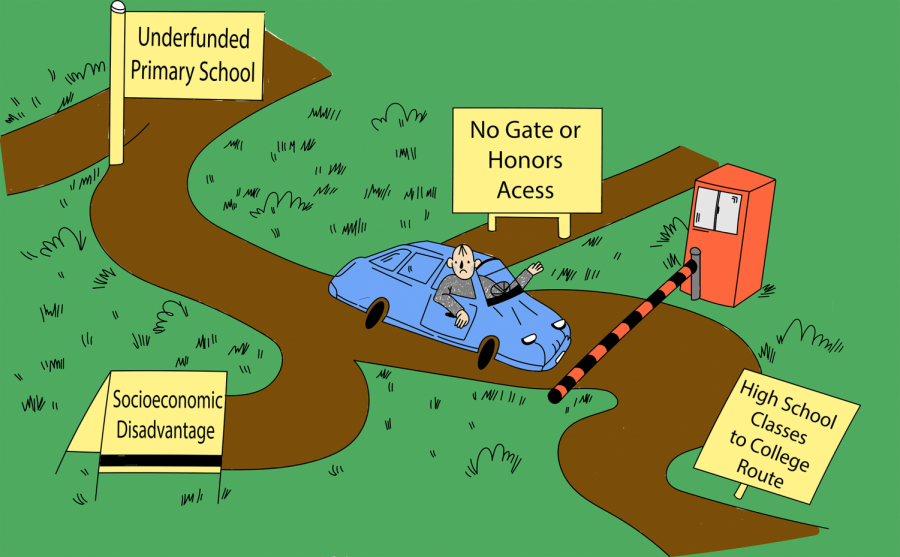Staff Editorial: Student Tracking Takes Steps Backward in Progressive Education
In the success-obsessed culture that is typical of Irvine youth, the comparison of ourselves to our peers is prevalent through our grades, our test scores and, most importantly, our class selections. Being recommended for advanced courses seems to be a “tell-all” sign of intellect, when in reality, these recommendations only show mastery of content, rather than legitimate intelligence. In order to maximize students’ potential, schools should not rigidly group students by their academic abilities; students should have numerous opportunities to move between non-honors and honors classes, especially at the high school level.
Tracking, or ability grouping, gives select students access to classes based on past academic performance, essentially grouping individuals with specific skill sets together, according to the National Education Association.
Within the Irvine Unified School District (IUSD), tracking is prevalent across schools of every level. For example, the Alternative Program for Academically Advanced Students (APAAS), which is available for fourth through sixth grade students at six different schools, places students in separated APAAS classes based on their intellectual performance on a placement exam.
“Once a student is identified as GATE, they remain GATE for the remainder of their school career in IUSD,” gifted programs and advanced learning coordinator Kara Rydman said. “GATE status does not always impact course placement at middle school and doesn’t have any bearing on high school course placement. APAAS students typically remain in the program for the full three years; however, a family can elect to leave the APAAS program at any time.”
The practice of tracking in addition to this mindset puts students coming from outside IUSD, or even from different schools at a significant disadvantage. Gifted identification does not transfer over from district to district, so students entering IUSD past the sixth grade often miss the window of opportunity to be set on that track.
“Seeing that I was from a school where I had no honors classes, they placed me in all CP courses…” sophomore Christopher Stocks said. “I love science. I want to do everything that the honors kids are doing. I want to be more intelligent, so when the time comes to go to college and pursue a science-related major, I can be ready and a little more advanced. There’s many things honors covers that CP doesn’t…At the time, I felt really sad and questioned what my teachers expected and thought of me. I didn’t feel understood.”
Although only a portion of students are separated by their ability in select classes in elementary and middle schools, tracking is most distinguishable at the high school level. With all core classes offering an honors or AP equivalent at Portola High, there is often a polarization between students in all honors classes versus students in all CP courses.
“Being in all weighted courses can be a struggle sometimes to balance all the courses along with extracurriculars and friends, but it’s also really great to be surrounded by peers that want to be in class and are willing and able to contribute in meaningful ways,” senior Jason Chen said. “However, I definitely feel that there is a lack of integration between ability levels, and because of that, some students that are only in honors classes will never interact with students in all non- honors classes.”
A study by Dr. Jacqueline Leonard and published by Mathematical Thinking and Learning concluded that when lower performing students are grouped homogeneously together, the students tend to perform worse on math tests than if they had been grouped heterogeneously with students of all ability levels. In addition,
Being identified in the GATE or APAAS program does not guarantee automatic placement into IUSD’s most rigorous courses. However, research has shown that the mindset developed when learning from a challenging curriculum at a young age allows students to have the necessary confidence to learn at a higher capacity.
According to conclusions drawn from an experiment conducted by Carol Dweck, the Lewis and Virginia Eaton Professor of Psychology at Stanford University, “When students believe they can get smarter, they understand that effort makes them stronger. Therefore they put in extra time and effort, and that leads to higher achievement.”
Although it is unattainable to completely integrate courses within Portola High, the possibility of integrating students of different achievement levels in a core subject is plausible. For example, provide one literary and language arts class for freshmen, and students seeking an honors-level class can complete supplemental work and be graded on a more challenging scale.
Current semester courses such as Contemporary Issues utilize this system. Students seeking the honors notation must write a comprehensive research paper on a subject of their choice, attend an event and write a page about their experience and lead a discussion with a writing piece for the class.
“As part of meeting the honors requirement for Contemporary Issues, I taught a lesson on the war on drugs and its connection to racism in America,” senior Aneska Smith said. “Everybody turned in one page about their thoughts as a homework assignment, and it was insightful to read all of their different responses; even though some kids were honors and some were not, it was really important to me to see how they responded.”
Schools like Harvest Collegiate High in New York City, New York have already successfully integrated this embedded honors system into all of the classes, besides AP. With this current program, all students are enrolled in the same class, but those who wish to become honors must apply at the beginning of the year; typically the percentage of honors students ranges around 25 percent. Honors students will then be monitored by teachers and if their participation in the course seems to deteriorate, intervention will occur.
While embedded honors does require additional work from teachers, John McCrann, a math teacher at Harvest Collegiate High, asserts that the experience of embedded honors provides benefits for students of all ability levels; diversity in the classroom allows for new perspectives and information to be introduced, enriching the education of honors and non-honors students.
The idea of tracking is overall flawed when it comes to encouraging intellectual growth in students at the high school level, especially at Portola High where groups of students of different academic abilities are strongly polarized. By having certain departments adopt or test out similar policies to the Contemporary Issues course, students would not identify by their honors or non-honors label and be more likely to shed their harmful fixed mindset toward education. The goal of preventing our academic capabilities from defining who we are has proven to be critical to an individual’s success, and it lies within from rigid identification of student intelligence through course labels.
Your donation will support the student journalists of Portola High School. Your contribution will allow us to purchase equipment and cover our annual website hosting costs.

Nate Taylor is the 2021-22 front page editor and photo editor. He is ready to improve his design skills and create memorable Portola Pilot front covers....




